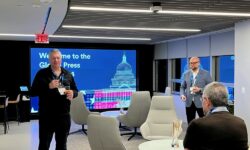How Paladin Became One of North America’s Largest Systems Integrators
Leaders from Paladin Technologies explain how the company is putting substance behind proven conventions for success such as strong culture, high technical IQ and exceeding expectations.

As a security integrator, what’s key to making a customer’s IT department feel good about what’s going to happen?
Morton: We focus on the initial hardening of a deployment and really establishing the cost of the engagement, compliancy with that hardening, that setup, before it goes out. The larger types of jobs we do go through a very extensive predeployment process. They typically culminate just before deployment with penetration testing in one of our facilities to ensure that client’s system is fully ready to go. It may not have all the devices connected yet but at least it shows all the integrations are solid and network traffic is working as advertised. Then it’s about coordinating with the clients regarding adaptations and an overlay of whatever cybersecurity program they want to apply. We make sure we’re aware of their requirements, but also know where our responsibilities begin and end on any given deployment.
Let’s talk a little bit more about technology. What areas are you excited about and why?
Sime: With the evolution of the circuit-based on-premises, air-gapped systems to offerings that are more flexible and enable access, the big thing is how the underlying engine is shifting to a point where it’s much easier to get functionality in front of the end user. That is due to more modern capable software feature-wise. There’s machine learning sitting behind the curtain there, picking some of the load off the operators and getting real events into the hands of the end user, making the systems more usable and flexible.
There’s a few different places that’s coming from, one being the whole AI conversation. AI has been overpromised and underdelivered for a very long time. But I think machine learning specifically is going to bring some solutions to narrowly defined problems that will take the load off people and make their work lives better by not having to worry about monitoring very basic things. Mobile access and biometrics are going to be a key pivot point for new infra-structure, especially to enable touchless access environments as an outcome of the pandemic.
Morton: I am a more tried, tested and true type thinker as opposed to a visionary. I have to support what we’ve just sold and that we can actually deliver it, instead of just conceptualize it. Some of us tend not to be too bleeding edge that way. I enjoy proven systems that work, that we continue to invest in and enhance. We have our own Dynatrol, a command-and-control system for very high security requirements that runs off building automation-type principles and logic. We are able to build automation sequences to any type of event very nimbly and internally for our clients. This gets away from traditional licensing models and is quite an intensive product development cycle when different integrated products go through upgrades and back to a compatible status and certified.
We’re very flexible in deploying a solution that might fit a gap, where third-party products don’t. That’s something that I’ve been very interested in learning about and we deploy this into prisons and courthouses and other places, where failure is not an option. We can’t have a device go offline, and then the operator cannot get the outcome that they need at that instant. We’re bringing systems together and unifying them in a way that some of our competitors can’t bring to the table.

A team of technicians outside Paladin’s Toronto office. The business employs about 1,000 associates in total.
How has the company contended with the pandemic and where do things stand today?
Morton: Our business slowed down at the beginning as everyone adjusted to the reality a year ago, but it recovered quickly. We were focused on solutions and services, meeting sometimes complex requirements to facilitate essential services. Those clients still needed service, they still needed projects to go ahead. In fact, some of them accelerated projects to meet the current state and make sure, especially on the logistics side, they could carry on and ramp up. On the datacenter side for infrastructure, the same thing.
While we had a slowdown and a pause, it gave us a lot of benefits as well. That time allowed us to reset on our core principles, our values. We really reinforced our standards of operation. We nationally got together and built a stronger mousetrap in many areas and in people development. I’d say we’re in a very lucky spot in the industry because of our positioning.
Morris: Out of our U.S. division, we noticed it was a little different from state to state. There were more regulations in in different areas as far as what we were allowed to and not allowed to do. We fought really hard to keep all our employees working and keep everybody going throughout the pandemic, and I thought we did a really good job at it.
Did Paladin have to furlough personnel or cut hours, etc.?
Morton: We did some temporarily, but we made a commitment to recall employees as quickly as we could. Only the markets with mandatory lockdowns and government-mandated restrictions forced our sites to close. Others were relatively mildly affected thankfully. We made very fast decisions very fluidly, running our business nimbly and focused on our clients and their needs and what our staff needed. Some of those who had to unfortunately be furloughed were voluntary. They had vulnerable partners or family members for whom they were fearful.
Stephanie Whalen: Our organization also did a really good job at communication as the pandemic initially hit and heightened. Even those who did face temporary layoffs, our leadership team did an excellent job at checking in with everybody on a personal level. We have weekly calls, weekly touchpoints, and that reconfirmed the culture we have within our organization and really showed that our employee base across North America is truly supportive of one another. We received a lot of excellent feedback from employees on how frequently we communicated and stayed connected throughout each wave.

As a broad-spectrum provider, Paladin operates ULC-certified central stations for national client support.
Do you see product or technology opportunities coming out of the pandemic?
Sime: We have had to fit together more parts and pieces to make things work seamlessly for businesses to keep operating during the conditions, restrictions and reporting requirements. The collaboration of our people to bring that competency to bear continues to be a value for us and an opportunity, and it has only strengthened us. As for specific technologies, there’s likely more opportunity for touchless entry, whether that’s through mobile or biometrics. Then, as the underlying IT infrastructure shifts, there was a rush to the Cloud and a bounce-back to on-prem infrastructure. That’s changing the technologies we’re presenting and how we’re architecting systems to enable remote access and allowing the employees, security guard force and people responsible for facilities to gain access.
What are a couple of lessons learned from the pandemic ordeal that are going to make the business stronger moving forward?
Morton: The pandemic provided a rapidly changing set of requirements that reinforced we were on the right track with our decentralized, regional and local decision-making nimbleness. That has led to us refocusing on our core values and being able to have conversations with team members aligned around those core values.
Doing that makes them real, which is important for a relatively young, rapidly growing company. As we bring in new team members, being able to center them on this core of how we operate helps them make faster, independent decisions aligned with our culture. We have this great balance of central structure and process and support as well as the ability to pivot very quickly.
We’ve also been making more of what could have been less productive time. When were unable to have people on client sites we had them working internally to improve us. Be it everything from logistics, warehousing, distribution, supply chain and working with clients on appropriate product selections for the pandemic. There was a craze for a while with devices that weren’t medically approved and other options. People looked to a company like ours and our team members for expert advice, not just to sell them something. Our product team has done a great job of sifting the wheat from the chaff, and that’s only made us stronger.
Click here to check out an extended version of this interview in SSI‘s Security Speaking podcast.
If you enjoyed this article and want to receive more valuable industry content like this, click here to sign up for our FREE digital newsletters!

Security Is Our Business, Too
For professionals who recommend, buy and install all types of electronic security equipment, a free subscription to Commercial Integrator + Security Sales & Integration is like having a consultant on call. You’ll find an ideal balance of technology and business coverage, with installation tips and techniques for products and updates on how to add to your bottom line.
A FREE subscription to the top resource for security and integration industry will prove to be invaluable.








